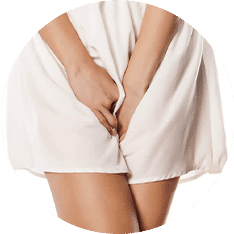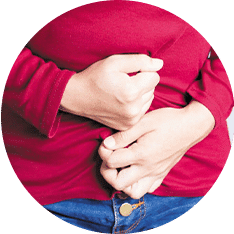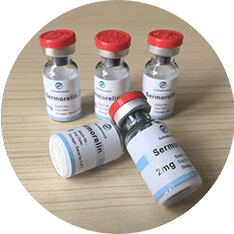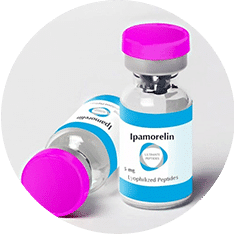
Unlock a More Youthful You With Hormone Replacemment Therapy In Victory Gardens, NJ
Aging is inevitable, and for many, it signals the beginning of a new chapter - one where you cross off bucket list items and live life to the fullest, on your own terms. However, for some women, aging is a horrible prospect, filled with chronic fatigue, irritability, and inability to perform in the bedroom. If you're concerned about life in middle age and beyond, we've got great news: there are easy, proven steps that you can take to help stop the negative effect of aging.
Global Life Rejuvenation was founded to give women a new lease on life - one that includes less body fat, fewer mood swings, and more energy as you age. If you're ready to look and feel younger, it's time to consider HRT (hormone replacement therapy), and growth hormone peptides. These therapies for men and women are effective, safe, and customized to fit your goals, so you can keep loving life as you get older.
HRT, and growth hormone peptide therapies bridge the gap between your old life and the more vibrant, happier version of you. With a simple click or call, you can be well on your way to a brighter future. After all, you deserve to be the one in charge of your wellness and health. Now, you have the tools to do so - backed by science and applied by our team of HRT experts with more than 13 years of experience.
What is HRT?
As women age, their hormones begin to go through changes that affect their day-to-day lives. For women, hormone deficiency and imbalance usually occur during menopause and can cause chronic fatigue, hot flashes, and mood swings, among other issues. Hormone replacement therapy helps correct hormone imbalances in women, helping them feel more vibrant and virile as they age.
Often, HRT treatments give patients enhanced quality of life that they didn't think was possible - even in their 60's and beyond.
The benefits for women are numerous and are available today through Global Life Rejuvenation.
HORMONE REPLACEMENT THERAPY
HRT and Anti-Aging Medicine for Women in Victory Gardens, NJ
As women age, their bodies begin to go through significant changes that affect their quality of life. This change is called menopause and marks the end of a woman's menstrual cycle and reproduction ability. Though there is no specific age when this change occurs, the average age of menopause onset is 51 years old. However, according to doctors, menopause officially starts 12 months after a woman's final period. During the transition to menopause, women's estrogen and other hormones begin to deplete.
As that happens, many women experience severe symptoms. These symptoms include:
- Hot Flashes
- Chronic Fatigue
- Incontinence
- Trouble Sleeping
- Dryness
- Muscle Loss
- Fat Gain
- Mood Swings
The symptoms of hormone deficiency can be concerning and scary for both women and their spouses. However, if you're getting older and notice some of these symptoms, there is reason to be hopeful. Hormone replacement therapy and anti-aging medicine for women can correct imbalances that happen during menopause. These safe, effective treatments leave you feeling younger, healthier, and more vibrant.


What Causes Menopause?
The most common reason for menopause is the natural decline in a female's reproductive hormones. However, menopause can also result from the following situations:
Oophorectomy: This surgery, which removes a woman's ovaries, causes immediate menopause. Symptoms and signs of menopause in this situation can be severe, as the hormonal changes happen abruptly.
Chemotherapy: Cancer treatments like chemotherapy can induce menopause quickly, causing symptoms to appear shortly after or even during treatment.
Ovarian Insufficiency: Also called premature ovarian failure, this condition is essentially premature menopause. It happens when a woman's ovaries quit functioning before the age of 40 and can stem from genetic factors and disease. Only 1% of women suffer from premature menopause, but HRT can help protect the heart, brain, and bones.
Common Issues for Women During Menopause
For many women, menopause is a trying time that can be filled with many hormonal hurdles to jump through. A little knowledge can go a long way, whether you're going through menopause now or are approaching "that" age.
Here are some of the most common issues that women experience during menopause:

Depression
If you're a woman going through menopause and find that you have become increasingly depressed, you're not alone. It's estimated that 15% of women experience depression to some degree while going through menopause. What many women don't know is that depression can start during perimenopause, or the years leading up to menopause.
Depression can be hard to diagnose, especially during perimenopause and menopause. However, if you notice the following signs, it might be time to speak with a physician:
- Mood Swings
- Inappropriate Guilt
- Chronic Fatigue
- Too Much or Too Little Sleep
- Lack of Interest in Life
- Overwhelming Feelings
Remember, if you're experiencing depression, you're not weak or broken - you're going through a very regular emotional experience. The good news is that with proper treatment from your doctor, depression isn't a death sentence. And with HRT and anti-aging treatment for women, depression could be the catalyst you need to enjoy a new lease on life.

Hot Flashes
Hot flashes - they're one of the most well-known symptoms of menopause. Hot flashes are intense, sudden feelings of heat across a woman's upper body. Some last second, while others last minutes, making them incredibly inconvenient and uncomfortable for most women.
Symptoms of hot flashes include:
- Sudden, Overwhelming Feeling of Heat
- Anxiety
- High Heart Rate
- Headache
- Nausea
- Dizziness
Typically, hot flashes are caused by a lack of estrogen. Low estrogen levels negatively affect a woman's hypothalamus, the part of the brain that controls body temperature and appetite. Low estrogen levels cause the hypothalamus to incorrectly assume the body is too hot, dilating blood vessels to increase blood flow. Luckily, most women don't have to settle for the uncomfortable feelings that hot flashes cause. HRT treatments for women often stabilize hormones, lessening the effects of hot flashes and menopause in general.

Mood Swings
Mood swings are common occurrences for most people - quick shifts from happy to angry and back again, triggered by a specific event. And while many people experience mood swings, they are particularly common for women going through menopause. That's because, during menopause, the female's hormones are often imbalanced. Hormone imbalances and mood swings go hand-in-hand, resulting in frequent mood changes and even symptoms like insomnia.
The rate of production of estrogen, a hormone that fluctuates during menopause, largely determines the rate of production the hormone serotonin, which regulates mood, causing mood swings.
Luckily, HRT and anti-aging treatments in Victory Gardens, NJ for women work wonders for mood swings by regulating hormone levels like estrogen. With normal hormone levels, women around the world are now learning that they don't have to settle for mood swings during menopause.

Weight Gain
Staying fit and healthy is hard for anyone living in modern America. However, for women with hormone imbalances during perimenopause or menopause, weight gain is even more serious. Luckily, HRT treatments for women coupled with a physician-led diet can help keep weight in check. But which hormones need to be regulated?
- Estrogen: During menopause, estrogen levels are depleted. As such, the body must search for other sources of estrogen. Because estrogen is stored in fat, your body believes it should increase fat production during menopause. Estrogen also plays a big part in insulin resistance, which can make it even harder to lose weight and keep it off.
- Progesterone: Progesterone levels are also depleted during menopause. Progesterone depletion causes bloating and water retention, while loss of testosterone limits the body's ability to burn calories.
- Ongoing Stress: Stress makes our bodies think that food is hard to come by, putting our bodies in "survival mode". When this happens, cortisol production is altered. When cortisol timing changes, the energy in the bloodstream is diverted toward making fat. With chronic stress, this process repeatedly happens, causing extensive weight gain during menopause.

Low Libido
Lowered sexual desire - three words most men and women hate to hear. Unfortunately, for many women in perimenopausal and menopausal states, it's just a reality of life. Thankfully, today, HRT and anti-aging treatments Victory Gardens, NJ can help women maintain a normal, healthy sex drive. But what causes low libido in women, especially as they get older?
The hormones responsible for low libido in women are progesterone, estrogen, and testosterone.
Progesterone production decreases during perimenopause, causing low sex drive in women. Lower progesterone production can also cause chronic fatigue, weight gain, and other symptoms. On the other hand, lower estrogen levels during menopause lead to vaginal dryness and even vaginal atrophy or loss of muscle tension.
Lastly, testosterone plays a role in lowered libido. And while testosterone is often grouped as a male hormone, it contributes to important health and regulatory functionality in women. A woman's testosterone serves to heighten sexual responses and enhances orgasms. When the ovaries are unable to produce sufficient levels of testosterone, it often results in a lowered sex drive.

Vaginal Dryness
Often uncomfortable and even painful, vaginal dryness is a serious problem for sexually active women. However, like hair loss in males, vaginal dryness is very common - almost 50% of women suffer from it during menopause.
Getting older is just a part of life, but that doesn't mean you have to settle for the side effects. HRT and anti-aging treatments for women correct vaginal dryness by re-balancing estrogen, progesterone, and testosterone. When supplemented with diet and healthy living, your vagina's secretions are normalized, causing discomfort to recede.

Fibroids
Uterine fibroids - they're perhaps the least-known symptom of menopause and hormone imbalances in women. That's because these growths on the uterus are often symptom-free. Unfortunately, these growths can be cancerous, presenting a danger for women as they age.
Many women will have fibroids at some point. Because they're symptomless, they're usually found during routine doctor exams. Some women only get one or two, while others may have large clusters of fibroids. Because fibroids are usually caused by hormone imbalances, hysterectomies have been used as a solution, forcing women into early menopause.
Advances in HRT and anti-aging medicine for women give females a safer, non-surgical option without having to experience menopause early. At Global Life Rejuvenation, our expert physicians will implement a customized HRT program to stabilize your hormones and reduce the risk of cancerous fibroid growth.

Endometriosis
Endometriosis symptoms are much like the effects of PMS, and include pelvic pain, fatigue, cramping, and bloating. While doctors aren't entirely sure what causes this painful, uncomfortable condition, most agree that hormones - particularly xenoestrogens - play a factor.
Endometriosis symptoms are much like the effects of PMS and include pelvic pain, fatigue, cramping, and bloating. While doctors aren't entirely sure what causes this painful, uncomfortable condition, most agree that hormones - particularly xenoestrogens - play a factor.
Xenoestrogen is a hormone that is very similar to estrogen. Too much xenoestrogen is thought to stimulate endometrial tissue growth. HRT for women helps balance these hormones and, when used with a custom nutrition program, can provide relief for women across the U.S.
Is HRT for Women the Right Answer?
Hormone stability is imperative for a healthy sex drive and for a normal, stress-free life during menopause. HRT and anti-aging treatments for women balance the hormones that your body has altered due to perimenopause or menopause.
HRT for women is a revolutionary step in helping women live their best lives, even as they grow older. However, at Global Life Rejuvenation, we know that no two patients are the same. That's why we specialize in holistic treatments that utilize HRT, combined with healthy nutrition, supplements, and fitness plans that maximize hormone replacement treatments.
If you've been suffering through menopause, is HRT the answer? That's hard to say without an examination by a trusted physician, but one thing's for sure. When a woman balances her hormone levels, she has a much better shot at living a regular life with limited depression, weight gain, mood swings, and hot flashes.
Here are just a few additional benefits of HRT and anti-aging treatments for females:


Benefits of HRT and Anti-Aging Medicine for Women in Victory Gardens, NJ
Hormone imbalance causes a litany of issues. But with anti-aging treatments for women, females can better process calcium, keep their cholesterol levels safe, and maintain a healthy vagina. By replenishing the body's estrogen supply, HRT can relieve symptoms from menopause and protect against osteoporosis. But that's just the start.
Global Life Rejuvenation's patients report many more benefits of HRT and anti-aging medicine for women:
- Fewer Mood Swings
- Thicker Hair
- Stronger Bones
- Less Body Fat
- More Energy
- More Stamina
- Increased Sex Drive and Pleasure Sensations
- Better Cognitive Functions
- Improved Pain Receptors
- Less Hot Flashes and Night Sweats
- Lower Triglycerides
- Fewer Bladder Infections
If you're ready to feel better, look better, and recapture the vitality of your youth, it's time to contact Global Life Rejuvenation. It all starts with an in-depth consultation, where we will determine if HRT and anti-aging treatments for women are right for you. After all, every patient's body and hormone levels are different. Since all our treatment options are personalized, we do not have a single threshold for treatment. Instead, we look at our patient's hormone levels and analyze them on a case-by-case basis.

HRT from Global Life Rejuvenation
At Global Life Rejuvenation, we help women rediscover their youth with HRT treatment for women. We like to think of ourselves as an anti-aging concierge service, guiding and connecting our patients to the most qualified HRT physicians available. With customized HRT treatment plan for women, our patients experience fewer menopausal symptoms, less perimenopause & menopause depression, and often enjoy a more youth-like appearance.
Reverse Aging with Growth Hormone Peptides
Growth hormone peptides are an innovative therapy that boosts the natural human growth hormone production in a person's body. These exciting treatment options help slow down the aging process and give you a chance at restoring your youth.

What is Sermorelin?
Sermorelin is a synthetic hormone peptide, like GHRH, which triggers the release of growth hormones. When used under the care of a qualified physician, Sermorelin can help you lose weight, increase your energy levels, and help you feel much younger.

Benefits of Sermorelin
Human growth hormone (HGH) therapy has been used for years to treat hormone deficiencies. Unlike HGH, which directly replaces declining human growth hormone levels, Sermorelin addresses the underlying cause of decreased HGH, stimulating the pituitary gland naturally. This approach keeps the mechanisms of growth hormone production active.
- Benefits of Sermorelin include:
- Better Immune Function
- Improved Physical Performance
- More Growth Hormone Production
- Less Body Fat
- Build More Lean Muscle
- Better Sleep

What is Ipamorelin?
Ipamorelin helps to release growth hormones in a person's body by mimicking a peptide called ghrelin. Ghrelin is one of three hormones which work together to regulate the growth hormone levels released by the pituitary gland. Because Ipamorelin stimulates the body to produce growth hormone, your body won't stop its natural growth hormone production, which occurs with synthetic HGH.
Ipamorelin causes growth hormone secretion that resembles natural release patterns rather than being constantly elevated from HGH. Because ipamorelin stimulates the natural production of growth hormone, our patients can use this treatment long-term with fewer health risks.

Benefits of Ipamorelin
One of the biggest benefits of Ipamorelin is that it provides significant short and long-term benefits in age management therapies. Ipamorelin can boost a patient's overall health, wellbeing, and outlook on life.
When there is an increased concentration of growth hormone by the pituitary gland, there are positive benefits to the body. Some benefits include:
- Powerful Anti-Aging Properties
- More Muscle Mass
- Less Unsightly Body Fat
- Deep, Restful Sleep
- Increased Athletic Performance
- More Energy
- Less Recovery Time for Training Sessions and Injuries
- Enhanced Overall Wellness and Health
- No Significant Increase in Cortisol
Your New, Youthful Lease on Life with HRT for Women
Whether you are considering our HRT and anti-aging treatments for women in Victory Gardens, NJ, we are here to help. The first step to reclaiming your life begins by contacting Global Life Rejuvenation. Our friendly, knowledgeable HRT experts can help answer your questions and walk you through our procedures. From there, we'll figure out which treatments are right for you. Before you know it, you'll be well on your way to looking and feeling better than you have in years!
 866-793-9933
866-793-9933
Request a Consultation
Latest News in Victory Gardens, NJ
Are coronavirus gardens the new 'victory gardens'? Vegetable planting on rise in Garden State
Melanie Anzideihttps://www.northjersey.com/story/news/coronavirus/2020/05/01/gardening-rise-nj-during-coronavirus-crisis/3052824001/
So, you want to plant a garden? You’re not alone.As New Jersey enters another week of the statewide stay-at-home order to curb the spread of the coronavirus, a budding number of people stuck inside are trying something new: growing fruits and vegetables in their backyards.But how do you safely garden in the Garden State, which has a legacy of contaminated land from its industrial past?Experts say homebodies are eager for fresh produce. Gardening businesses are busier than ever. More people are callin...
So, you want to plant a garden? You’re not alone.
As New Jersey enters another week of the statewide stay-at-home order to curb the spread of the coronavirus, a budding number of people stuck inside are trying something new: growing fruits and vegetables in their backyards.
But how do you safely garden in the Garden State, which has a legacy of contaminated land from its industrial past?
Experts say homebodies are eager for fresh produce. Gardening businesses are busier than ever. More people are calling county centers with questions about home gardening. And the National Gardening Association even created a guide for gardening during the pandemic.
With nurseries and garden centers deemed essential in the state, gardening is a recreational activity for people of all ages that helps pass time. Others may be picking up gardening because they want to be more self-sufficient — a theme some compare to the victory gardens of World Wars I and II, when a food crisis resulted in a nationwide campaign that urged people to start home gardens.
Christopher Leishear, owner of Glen Rock-based Farmburbia, which builds raised garden beds and similar structures for people at home, said business has taken off since the start of the pandemic. He started the company about five years ago after he noticed a demand for at-home gardening in suburban Bergen County, but most people didn't know where to start.
“Especially now with COVID, there seems to be even more people interested in self-sufficiency and sustainability," Leishear said. "People don’t want to go out like they used to. Not that having a few raised beds in your backyard can eliminate your ability to go to the grocery store, but it can contribute to you having fresh produce throughout the late spring, summer and fall — and people have just really taken to it.”
April, May and June are usually Farmburbia's busiest months, Leishear said. However, some of his larger projects that require multiple people have been delayed because of social distancing guidelines. The backlog of orders is likely to keep him busy through July and possibly into August.
Experts say that raised beds and gardening with containers or pots are safe and convenient options for those unsure about contaminants in their soil.
Safety concerns: Some gardening tips and tricks
New Jersey, with its long list of Superfund sites and plots requiring cleanup by the state, has plenty of contaminated land. That's why soil is usually tested for contaminants before a garden is planted. Any would-be gardener who wants to know the history of their land before starting a garden should contact their local town hall, experts suggest. Municipal offices should have the history of all properties in town.
When brownfields are being reclaimed for gardening, organizations will run a soil test first, said Michelle Infante-Casella, a county agent for Rutgers' Cooperative Extension of Gloucester County. The test usually looks for contaminants such as lead. A gardener could have their home's soil tested by commercial labs. Search online for environmental labs or soil testing labs, and follow the instructions, Infante-Casella recommended.
Open for Business:Eisele's Nursery in Paramus an oasis amid the coronavirus pandemic
For subscribers:Retail was already struggling. Here's how shopping is expected to change when malls reopen
Anyone concerned about the safety of their land, or with limited space for a garden, can turn to container planting. Some vegetables that grow well in pots or containers include tomatoes, pepper plants, lettuce, onions and root vegetables like radishes or carrots.
"Just make sure you figure out by reading or looking on the seed packet or investigating how large a plant will get before you put it in a container," Infante-Casella said. "A container may only be able to hold one plant because it grows too large."
Story continues below photo gallery
Bruce Crawford, Rutgers' statewide horticulture coordinator who is transitioning from his years-long role as director of Rutgers Gardens, said container gardens don't have to be high maintenance.
"You could use an old barbecue base. You can improvise with an old galvanized container and put some holes in the bottom of it and grow anything from squash to tomatoes to lettuce to beets," Crawford said. "You don’t need actually to have a plot of land, as long as you have a sunny balcony or porch or something of that nature — a front door stoop. You can grow vegetables there."
The demand for at-home gardening has been so great, Crawford said, that the state university is preparing to roll out evening question-and-answer sessions on Facebook. He anticipates interest to continue through the summer.
Right now is prime time to plan your garden, experts said. May is typically the peak gardening season in the Garden State, since the "frost free" date in New Jersey is around May 15. That's the date when soil temperatures are warm enough for vegetables and other plants to survive underground.
"Starting next week almost everything can start being planted because we won’t have frost anymore for the season," Infante-Casella said.
There are other basic tips expert gardeners advise newbies to follow: find a location with lots of sunlight; ensure proper drainage for plants by avoiding an area that puddles, or by poking holes at the bottom of a container; try your hand at some of the easier crops first, like beets or beans.
“My advice is just to start," said Leishear. "Start small — a few container pots on your deck or your patio or even in your window sill. You can cut a stem of basil, drop it in a glass of water, and in seven to 10 days later, it has roots and it’s growing in size. So, you don’t need a lot of space."
There are also lots of guides online for first-time gardeners. Rutgers offers an online curriculum and helpful fact sheets. Princeton and Cornell also offer resources online. Duke Farms in Hillsborough has been hosting classes through Zoom to teach gardeners about vegetable seed starting and container gardening. The National Gardening Association, which tracks the growth of gardening nationwide and offers countless resources online, has a tool that outlines frost dates for planting based on zip-codes.
Dave Whitinger, the association's executive director, said traffic to the group's website has grown by 114% this year. About 700,000 people visited the organization's website last week, compared to about 290,000 the same week last year. The increase in demand has been felt across the industry, he added.
"I’ve talked to many, many companies in the industry and everybody’s reporting that they’re essentially selling everything that they have," Whitinger said. "Nobody has to advertise their products right now, because nobody is having trouble selling. Many of the seed companies are completely out of stock."
Experts tout several advantages to gardening at home: higher quality food, more variety in the types of food you consume, food security in your own backyard, exercise, stress relief, and family bonding
"When you have a young child start a seed that they watch grow, a lot of times the children will be more apt to eat something that they grew," Infante-Casella said.
Crawford, the Rutgers horticulture coordinator, said that if families make home gardening a part of their daily routine, we may see a permanent shift to the practice.
"I do anticipate certainly for the next couple of decades that there will be a greater interest in backyard gardening and maintaining a degree of self-sufficiency from a food standpoint," Leishear said.
Melanie Anzidei is the retail reporter for NorthJersey.com. To get unlimited access to the latest news about store openings and closings in North Jersey’s biggest malls, shopping centers and downtowns, please subscribe or activate your digital account today.
Patriotic Vegetables: Bringing Back The Victory Garden
Tamera Schreurhttps://patch.com/new-york/bronxville/patriotic-vegetables-bringing-back-the-victory-garden-b52f5153
This post was contributed by a community member. The views expressed here are the author's own.Community CornerHere's a new way to show your patriotism this summer, Bronxville-Eastchester.NeighborI took a little drive around town last night en route to the library. Saw lots of people walking purposely from the train, a few joggers and a couple of dog walkers. I also saw blue hydrangeas in bloom, green grass, and climb...
This post was contributed by a community member. The views expressed here are the author's own.
Here's a new way to show your patriotism this summer, Bronxville-Eastchester.
Neighbor
I took a little drive around town last night en route to the library. Saw lots of people walking purposely from the train, a few joggers and a couple of dog walkers. I also saw blue hydrangeas in bloom, green grass, and climbing ivy. No vegetable gardens in sight though, at least not from my car window.
I was on the lookout for such gardens after seeing patriotic posters at an art museum recently. These posters featured vegetables. That’s right, vegetables. No guns in sight. They sprouted patriotic statements like, “Sow the Seeds of Victory: Plant and Raise Your Own Vegetables,” “Dig on For Victory” and “Uncle Sam Says Garden.”
Vegetables aren’t the usual image we have when patriotism stirs our hearts nowadays. I doubt if any of us thought of red, white or blue veggies on the Fourth! No, it was more likely and summertime classics at the Philharmonic that were on our minds.
But vegetables and gardens were very much on people’s minds during WWI. Farmers had left their fields to become soldiers, and food became scarce. Ration cards were used to limit certain items. When you were out of your allotted eggs, milk or meat, you had to wait until the next week to be allowed to get more. It was a tough time. It was tough on families and soldiers too.
Find out what's happening in Bronxville-Eastchesterwith free, real-time updates from Patch.
Let Patch save you time. Get great local stories just like this delivered right to your inbox or smartphone everyday with our free newsletter. Fast signup here.
Everyone needs to eat whether it’s wartime, or not. Charles Lathrop Pack did some outside-the-box thinking in March 1917 and seeded a whole new idea to the American public. Grow a Victory Garden at home! Use your yards, empty lots in your cities, and even on your rooftops (now known to be a very green way to lower electrical costs.)
The idea worked. The National War Garden Commission was created. Local initiatives to grow your own food sprouted up all around America. Men, women and children, even those who had never handled a small vegetable seed, shoveled away excuses and learned to grow their own food. It’s estimated that 20 million victory gardens were planted. Eleanor Roosevelt planted one on the White House lawn. Even agri-business, to the surprise of many, jumped on board promoting community gardening and food production. The U.S. Department of Agriculture estimates that the vegetables and fruit harvested in the Victory Gardens were an amount equal to all commercial production of vegetables—about 9-10 million tons. Think of it!
Victory gardens, a by the people for the people initiative, worked. Health,y fresh food was more available for civilians and soldiers alike. The backyard farm-to-table initiative worked in other ways too.
We don’t have to think too much about food scarcity in Tarrytown and Sleepy Hollow. It’s not an issue. There’s plenty and I'm glad about that. There’s plenty of choice too.
You can get it ready-made, cook it yourself, eat out, or have it delivered. It’s easy to get. Just stop by or , bulk shop at the or sample the fancy meats of . It's like this in many parts of America.
But, despite the wide availability of food we have, Victory Gardens are making resurgence in America. The reasons for their renewed popularity isn’t from promotional posters or wartime scarcity. I think they’re back because of those other pluses, the ones about health improvements, emotional well-being, family values, and community.
It’s all good stuff to nurture. All stuff that benefits individuals, families, and communities, like our own. Heck, on a small scale, it even benefits America. Growing a Victory Garden was called being patriotic in 1917. I think it can still be called that in 2012.
I’ll attest to the value of a Victory type garden from my own experience. For the past three years I’ve been one of the adult helpers at the children’s garden at Greenville Community Church. It’s a small plot. It doesn’t even get full sun. But, our “Garden of Eat’in” is not about quantity, it’s about the shared multi-generational experience, learning together, and appreciating the wonderful world of nature.
It’s really cool to watch kids who earlier would gag on eating a vegetable, eagerly pop a sugar snap pea, skin and all, into their mouth and smile big. Or, proudly walk around carrying a basket of yellow tomatoes to share with others.
If you have a small piece of soil, or even just a simple container, you can produce a Victory Garden. And, don’t worry, it isn’t about quantity. Living here, you can still buy all the food you want in addition to what your garden produces.
You can start with one tomato plant. Or whatever your favorite vegetable is. Plant a fruit tree. Or raspberries. Create the garden with your kids. Talk about sharing one with your next door neighbor, or your faith community. Or tend some herbs on a sunny windowsill. It might take fertilization of your resourcefulness to get started, but remember those who did it before, all the way back to WWI. They didn’t know what they were doing. But they plowed ahead and did it anyway. And, it worked.
Good help on gardening is available from the library, gardening friends or why not stop by one of the several nurseries on 9A.
Why not grow your patriotism this July in a new way and start a Victory Garden?
It’ll be a win-win.
Creative community connections
Jolene Hansenhttps://www.gardencentermag.com/article/creative-community-connections/
Support for local community organizations is a hallmark of independent garden centers. When schools and other groups need fundraising help, they often turn to local IGCs first. Now growing interest in community gardening, local foods and edible schoolyards is turning the tables and providing IGCs with fresh opportunities to deepen community ties and take the cap off the traditional spring season.Reconnecting with community garden roots.At Mendham Ga...
Support for local community organizations is a hallmark of independent garden centers. When schools and other groups need fundraising help, they often turn to local IGCs first. Now growing interest in community gardening, local foods and edible schoolyards is turning the tables and providing IGCs with fresh opportunities to deepen community ties and take the cap off the traditional spring season.
Reconnecting with community garden roots.
At Mendham Garden Center in Chester, N.J., co-owner Greg Loth and his staff are on a mission to simplify gardening for their community. By hearkening back to the patriotic roots of community gardening and the Victory Gardens of WWII, Loth hopes to reconnect gardeners with the simple victory of growing their own food.
Loth believes that information overload overwhelms many would-be gardeners.
“A lot of people could be involved in gardening, but they haven’t been exposed to it in a simple way,” he says. By helping people experience a part of history with a victory garden — whether a container or a community plot — excitement displaces discouragement.
“It’s a simple process to grow something. Then you eat it at the dinner table three months later,” Loth says. “There’s a lot of excitement that goes with that.”
Mendham’s victory garden focus got a boost when a local elementary school principal saw one of the IGC’s WWII-era Victory Garden posters. With Rosie the Riveter and superheroes such as Batman, Robin and Superman in Victory Garden settings, the posters became an age-appropriate history lesson and a coloring project for second graders. Another helpful fit is the IGC’s civic gardener, Cole Kleitsch, a former history and civics teacher. Kleitsch takes the Victory Garden message into the community through personal involvement with veterans and other groups.
“We don’t need a war to get together to start a garden,” Kleitsch says.
Last winter, Mendham staff visited community garden clubs and fostered connections with community gardens and local organic growers using the historic and patriotic to spur interest. The focus remains on simplicity, victorious gardening, organic methods, and locally grown produce. Late-summer plans include seminars in canning and pickling, while winter will see community groups on site learning about year-round growing through indoor gardening.
“We want to help people continue the gardening experience year-round,” Loth says. “The victory is in the growing.”
Taking school connections into the field.
Many IGCs are connecting to school gardens, but Oregon-based Al’s Garden Center is forging school connections with a broader scope. By partnering with a statewide Adopt a Farmer program designed to reconnect kids with their agricultural roots, Al’s is reaching the next generation of gardeners and horticulturists.
When Oregon Aglink approached Al’s, the program seemed a natural fit given the company’s history of community involvement and service.
“This type of involvement is grounded in this company’s values,” says Laura Hammond, Al’s director of marketing. “Being part of the communities we serve is one of the ‘seeds of knowledge’ training that all employees go through at Al’s Garden Center.”
Adopt a Farmer pairs agricultural businesses with classrooms for the academic school year. This past year, Al’s first in the five-year-old program, the company was matched with a class of 70 eighth-graders, complete with related science curriculum. At this academic level, the classwork involved a simulation of a nursery production business, including crop choices, planting decisions, production spreadsheets, profit/loss statements, and even roll-of-the-dice variables such as unexpected utility increases. Students visited Al’s farm and were exposed to propagation, automation, and crop rotation, and Al’s staff visited the classroom in return.
Mallory Phelan, Oregon Aglink vice president of operations, says the program reached out to ranchers, nurseries, and wineries in an effort to show kids that agriculture and farming involves more than traditional crops such as beans and corn.
“There’s no one else that we know of with the same type of program,” Phelan says. Organized and run through a nonprofit, it covers expenses for the field trips, substitute teachers and other related costs. Several nurseries have now joined the program’s ranks.
Hammond says that rewards from Al’s involvement range from “revived and re-excited” employees to the look on a child’s face. The staff is excited about the approaching school year. “It’s a win all the way around,” Hammond says. “We want to cultivate our love of the earth and gardening into the next generation.”
Building community from the inside out.
For Wisconsin-based McKay Nursery, connections with community gardens and school initiatives reach wide, but also stay close to home. One example is the company’s employee garden, started in 2013 as part of a regional initiative to increase sustainability among businesses. Set on land previously used for production with seed started in McKay’s greenhouse, the first garden yielded more than 3,000 pounds of produce distributed to employees, four local food pantries and two local fire departments. About 30 employees now work together on a scaled-back version, handling planting, weeding, harvesting and watering.
Much of McKay’s community involvement impacts schools, healthy eating programs, and sustainable native or edible landscape projects that transcend typical garden connections. One example is a regional healthy-eating initiative affiliated with the Wisconsin Department of Agriculture’s Farm to School program and the Wisconsin School Garden Network (WSGN). Beth Hanna, training and outreach specialist for WSGN, is enthusiastic about McKay’s support.
“McKay really gets involved, with fruit trees and edible packages in a very supportive, branded way,” she says. The company name is associated with healthy-eating and local foods programs, and winning schools have edible McKay plants in their school gardens.
McKay’s landscape and design studio has worked with several schools on projects incorporating edible landscapes and natural play areas. School fundraising packages include edible or native plant packages, herb starter kits, wild bird gardens, and other themes that can be used as teaching tools as well. Design staff are also well-versed in helping schools and other organizations write grants for garden projects. One example of community impact is HOME GR/OWN Milwaukee, a project to transform vacant urban lots into “pocket parks” with community gardens and sustainable designs that incorporate fruit trees, vegetables and native plants, while improving community access to healthy, locally grown food.
Launching with limited resources.
By nature, community requests for donations and IGC involvement often come when you can least afford to invest staff and resources. But making community involvement a priority — and spreading foundation-building programs throughout the year — can limit high-season interruptions and extend patronage beyond spring.
At McKay, that means getting involved with causes you care about rather than something trendy, as evidenced in the company’s commitment to schools and edibles.
“Any time we can help introduce a new generation to hardy perennial edibles, it just seems like a great win-win,” says Tim Flood, president of McKay. He notes that timing can be tricky, but encourages IGCs to start small and grow new ideas and partnerships in the off season.
With the success of Adopt a Farmer, Hammond suggests IGCs partner with statewide agriculture and other larger organizations.
“When the agricultural community and private garden centers and community connect, that’s when good stuff happens,” she says. “We’re all resource-limited, so leverage what other people are doing. Find a partnership that complements, then tap in, to have as big an impact as possible.”
With simplicity spelling victory at Mendham Garden Center, Loth keeps his advice for community connections just as straightforward.
“I look back at the business over so many years, and people looking for that next SKU to make a difference,” he says. “Let’s do what we enjoy doing — helping people — and everything else will follow.”
Jolene is a freelance writer and former hort professional based in Madison, Wisconsin. She is a frequent contributor to GIE Media Horticulture Group publications.
Enter your email to receive our newsletters.
Loading...
Read Next
Independent garden center partners who can help extend your season
Explore the July 2016 Issue
Check out more from this issue and find you next story to read.
Latest from Garden Center
Community Gardens Spruce Up Neighborhoods
Claire Sommerhttps://patch.com/new-jersey/westorange/community-gardens-spruce-up-neighborhoods
This post was contributed by a community member. The views expressed here are the author's own.Community CornerAn occasional feature showcasing interesting township gardens, gardenersNeighbor|Updated Sat, Jul 17, 2010 at 2:17 pm ETIt started with an idea that harkened back to the residential vegetable gardens called "Victory Gardens" that Americans planted during World War I and World War II....
This post was contributed by a community member. The views expressed here are the author's own.
An occasional feature showcasing interesting township gardens, gardeners
Neighbor
|Updated Sat, Jul 17, 2010 at 2:17 pm ET
It started with an idea that harkened back to the residential vegetable gardens called "Victory Gardens" that Americans planted during World War I and World War II.
Ten years ago, Herbert Peitzer, an Essex County master gardener and West Orange resident for more than 50 years, contemplated the lack of garden space for people without yards and thought, "We should have a community garden in town."
Along with his friend and fellow master gardener, Bern Wallerstein, and with the support of the West Orange Recreation Department, he founded the West Orange Community Garden in a sunny lot behind the West Orange First Aid Squad off of Mount Pleasant Place.
Residents tend one of the 14 raised-bed plots that grow a plentitude of vegetables, fruits and flowers for a $20 annual fee. The recreation department maintains the overall fenced property and supplies compost and mulch in the spring.
The department accepts applications for beds in the spring, with current gardeners receiving first priority. Peitzer said spaces become available occasionally as peoples' lives change.
Find out what's happening in West Orangewith free, real-time updates from Patch.
As a certified master gardener, Peitzer donates his time to the public at the Essex County Environmental Center on Eagle Rock Avenue in Roseland. All residents can call the free hotline for garden, yard or plant advice (see below). Peitzer is one of the experts who answer those questions.
He offered helpful advice to a visitor during a tour of the garden, with a tip for foiling groundhogs.
"Put up a low fence around your garden but leave the top foot or so of fencing loose instead of taut," he said. "When the groundhog tries to crawl up the fence, he'll be unable to get a secure footing and give up."
Across from the Essex Green Shopping Center, another community garden is growing in the Eagle Ridge at West Orange development.
Resident Diane Frohling got the idea for a community garden in spring 2008, after years of wanting a garden, but lacking the time. "I probably should have been a farmer," joked the former Montclair realtor.
With several other Eagle Ridge residents, Frohling brought the idea before the Property Owners Association.
The Eagle Ridge Community Garden was approved and construction began in May 2008. Members paid a one-time fee of $170 to build a seven-foot fence and receive one of the 32 5-foot by 5-foot raised beds. Each gardener pledges to avoid chemical fertilizers and pesticides.
Now in its second year, the garden is thriving at building friendships, as well as food, according to Frohling. The group plans an annual clean-up day and has held social events in the garden.
"It can be hard to make new friends in a big community," said Mitch Winick, a resident at Eagle Ridge. "Gardening is not only a good way to meet people but also to get some healthy physical and mental exercise."
Several plots are available. Interested Eagle Ridge residents can contact Frohling.
The free Essex County Master Gardener Hotline number is (973) 228- 2210 and is staffed every weekday from 10 a.m. to 2 p.m. year round.
How residents in Dover, Victory Gardens and Hanover Park voted on school referendums
William Westhovenhttps://www.dailyrecord.com/story/news/2022/12/14/hanover-park-dover-victory-gardens-school-district-referendums-new-jersey/69727246007/
Voters in three towns on Tuesday approved a $44.4 million referendum for upgrades to the two "crumbling" high schools in the Hanover Park School Regional School District.But Dover voters overwhelmingly rejected a $69.3 million referendum to expand the high school and build a second middle school in the overcrowded district.Unofficial results from the Morris County Board of Elections show the Hanover Park referendum passed by a vote of 1,493 (55.5%) to 1,179 (43.8%). The district serves high school students from Hanove...
Voters in three towns on Tuesday approved a $44.4 million referendum for upgrades to the two "crumbling" high schools in the Hanover Park School Regional School District.
But Dover voters overwhelmingly rejected a $69.3 million referendum to expand the high school and build a second middle school in the overcrowded district.
Unofficial results from the Morris County Board of Elections show the Hanover Park referendum passed by a vote of 1,493 (55.5%) to 1,179 (43.8%). The district serves high school students from Hanover, who attend Whippany Park High School and students from East Hanover and Florham Park who attend Hanover Park High School.
The district "anticipates that we now have the necessary funding available to make much-needed improvements to both of our high schools," Superintendent Maria Carrell said following the vote. "Over the next few months, we will be working closely with our district professionals to begin the first phase of this project as soon as possible."
Dover voters reject referendum, tax increase
But in Dover and tiny neighboring Victory Gardens, district officials saw voters reject a referendum that would have raised taxes by $611 annually for homeowners in the former and $579 for those in the latter. The expansion, officials said, was necessary in a district that is 700 students over capacity and rising, according to a report from the New Jersey Department of Education.
"For the last two years, our student enrollment numbers have steadily risen," the district wrote on a website touting the referendum. "Our schools have been over capacity for decades. Generations of residents have stepped up before to invest long-term in Dover Public Schools. The community is being asked to consider whether to do the same again."
The community rejected the referendum by more than 72% (1,022 to 374).
"The need to build a new school in Dover can’t be denied," Dover Board of Education President Dr. Krista Seanor said after the vote. "This election result doesn’t change that fact. I’m devastated by the reality of overcrowding and underfunding that our children must now continue to endure."
"We thank all [voters] who participated and will discuss with the community plans for the future of our schools," the district stated. "Evaluating the community’s feedback will be the first step in that process."
District officials hoped to build a new middle school between the high school and North Dover Elementary School, where tennis courts are now.
"A new middle school and expanded high school will provide space to spread out our students, leaving enough room for students at the elementary schools," they wrote.
In the Hanover Park district, infrastructure in both high schools schools "are original from the buildings," officials advised on the district website. Hanover Park opened in 1956. Whippany Park opened in 1967.
"Repairs have become costly; and sometimes, cost-prohibitive," the district wrote. "We have now reached the point that we must invest a considerable amount of money to make necessary improvements. This investment is expected to mitigate future costs for the district and its taxpayers."
Disclaimer:


